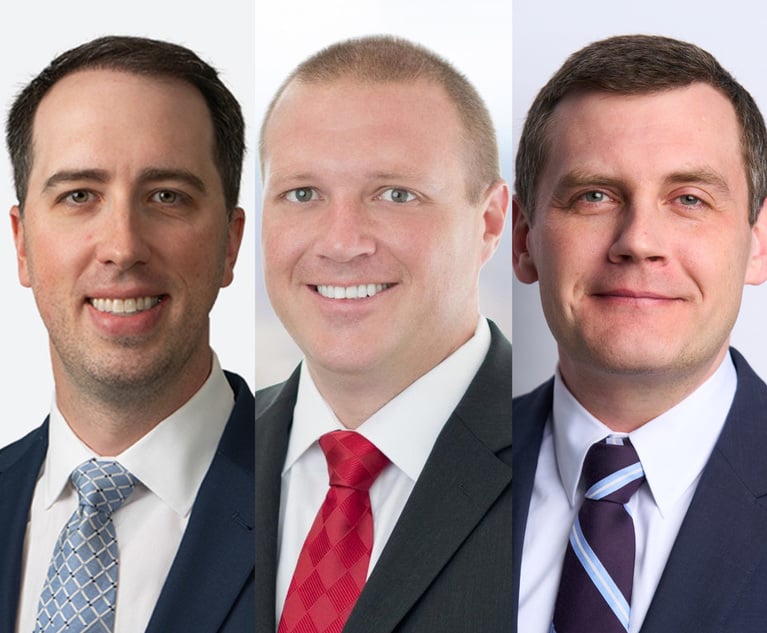Defense Verdict in Case of Man Left With Denture Stuck in Throat at Care Center
The jury rejected the family's claims that the three days the deceased man spent with a dental bridge stuck in his throat contributed to his death from complications of Parkinson's disease several months later.
February 06, 2018 at 02:25 PM
5 minute read

A Fulton County jury found no liability on the part of a long-term care facility and its staff physician accused of allowing an elderly patient to suffer for three days after he swallowed a dental bridge, which the plaintiffs said contributed to his death a few months later.
The defense said there will be more litigation as their clients pursue attorney fees. A statement from Carlton Fields, where Christopher Freeman and Justan Bounds are based in the Atlanta office, said they will seek almost $500,000 in attorney fees because the plaintiff turned down an offer to settle the case for an undisclosed sum in 2015.
Matthew Alford of LaGrange's Willis McKenzie, who represented the doctor with firm colleague Mark Degennaro, said he also will seek some of his client's fees based on a frivolous litigation notice he sent early in the case.
The plaintiffs' attorney, Fayetteville solo John Mrosek, said a posttrial challenge to the verdict is likely.
“My clients are certainly contemplating an appeal or motion for new trial,” said Mrosek. “We moved for a mistrial on Day Three because there were multiple errors of law.”
“Much of our evidence was excluded,” said Mrosek. “Our expert contended that the cause of death was not natural. His testimony was excluded midtrial.”
According to the lawyers, a Carlton Fields summary and court filings, the case began in October 2012 when Robert Coker, 86, was admitted to Kindred Transitional Care and Rehabilitation in Fayetteville after undergoing hip replacement surgery.
According to plaintiffs' filings, Coker's son told staff his father wore removable dental bridges and that the upper one appeared loose because there were “clicking” sounds when he talked.
The staff noticed Coker was making “gurgling” sounds the day after he was admitted. His son arrived and said Coker—who was then unable to speak—appeared to be in pain and asked that he be transferred to an emergency room, the plaintiff's filings said.
He made his concerns known to the nursing staff and physician Wendy Goza, but she declined to release Coker to the ER until three days later.
The ER staff at Piedmont Fayette Hospital used X-rays to determine that Coker's bridge had lodged in his throat but were unable to remove it because it was attached to his esophageal wall, according to the plaintiffs.
Coker was transported to Piedmont Atlanta, where a tracheal surgeon was able to remove the device.
One month later, Coker went into hospice for terminal Parkinson's disease. He died four months later from aspiration.
In 2014, Coker's son and daughter, Robert Coker and Sherri Hutson, sued Kindred Healthcare and Goza in Fulton County State Court for multiple counts including simple, gross and medical negligence and wrongful death.
The complaint said that, by allowing Coker to suffer for three days before releasing him, the defendants caused Coker's condition to deteriorate, affected his hip's healing, caused the loss of oxygen to his brain and spurred the aspiration that ultimately killed him.
In addition to the health care center's rejected settlement offer, the plaintiffs submitted a certified offer of judgment in 2016 for $1.25 million.
Alford said his client never offered to settle.
During a six-day trial before Chief Judge Diane Bessen, Alford said the defendants presented a united defense.
Key plaintiffs' witnesses included Queens, New York, geriatrics specialist Perry Starer and DeKalb County Medical Examiner Gerald Gowitt.
Alford said his key expert was family medicine specialist Harry Strothers from Macon, and Kindred's was Johns Island, South Carolina, geriatrician Gregory Compton.
After the trial began, Bessen granted a motion to exclude Gowitt's testimony “regarding the theorized acceleration of the decedent's death and shortening of his life-span by the injury complained of” by the plaintiffs.
The jury took about two-and-a-half hours to rule for both defendants on Jan. 29.
The attorneys did not speak to the jury afterward.
Alford said that, in his view, “Judge Bessen tried a very clean trial. Any chances of success on appeal would be unlikely.”
Mrosek felt otherwise.
“My clients wanted one thing: a fair trial to give justice to a man who laid in a bed for three-and-a-half days with a bridge in his throat,” he said.
This content has been archived. It is available through our partners, LexisNexis® and Bloomberg Law.
To view this content, please continue to their sites.
Not a Lexis Subscriber?
Subscribe Now
Not a Bloomberg Law Subscriber?
Subscribe Now
NOT FOR REPRINT
© 2024 ALM Global, LLC, All Rights Reserved. Request academic re-use from www.copyright.com. All other uses, submit a request to [email protected]. For more information visit Asset & Logo Licensing.
You Might Like
View All

Fowler White Burnett Opens Jacksonville Office Focused on Transportation Practice
3 minute read
On The Move: Polsinelli Adds Health Care Litigator in Nashville, Ex-SEC Enforcer Joins BCLP in Atlanta
6 minute read
Woman's Suit Alleging Negligence to Sex Trafficking by Hotel Tossed by Federal Judge
Trending Stories
Who Got The Work
Michael G. Bongiorno, Andrew Scott Dulberg and Elizabeth E. Driscoll from Wilmer Cutler Pickering Hale and Dorr have stepped in to represent Symbotic Inc., an A.I.-enabled technology platform that focuses on increasing supply chain efficiency, and other defendants in a pending shareholder derivative lawsuit. The case, filed Oct. 2 in Massachusetts District Court by the Brown Law Firm on behalf of Stephen Austen, accuses certain officers and directors of misleading investors in regard to Symbotic's potential for margin growth by failing to disclose that the company was not equipped to timely deploy its systems or manage expenses through project delays. The case, assigned to U.S. District Judge Nathaniel M. Gorton, is 1:24-cv-12522, Austen v. Cohen et al.
Who Got The Work
Edmund Polubinski and Marie Killmond of Davis Polk & Wardwell have entered appearances for data platform software development company MongoDB and other defendants in a pending shareholder derivative lawsuit. The action, filed Oct. 7 in New York Southern District Court by the Brown Law Firm, accuses the company's directors and/or officers of falsely expressing confidence in the company’s restructuring of its sales incentive plan and downplaying the severity of decreases in its upfront commitments. The case is 1:24-cv-07594, Roy v. Ittycheria et al.
Who Got The Work
Amy O. Bruchs and Kurt F. Ellison of Michael Best & Friedrich have entered appearances for Epic Systems Corp. in a pending employment discrimination lawsuit. The suit was filed Sept. 7 in Wisconsin Western District Court by Levine Eisberner LLC and Siri & Glimstad on behalf of a project manager who claims that he was wrongfully terminated after applying for a religious exemption to the defendant's COVID-19 vaccine mandate. The case, assigned to U.S. Magistrate Judge Anita Marie Boor, is 3:24-cv-00630, Secker, Nathan v. Epic Systems Corporation.
Who Got The Work
David X. Sullivan, Thomas J. Finn and Gregory A. Hall from McCarter & English have entered appearances for Sunrun Installation Services in a pending civil rights lawsuit. The complaint was filed Sept. 4 in Connecticut District Court by attorney Robert M. Berke on behalf of former employee George Edward Steins, who was arrested and charged with employing an unregistered home improvement salesperson. The complaint alleges that had Sunrun informed the Connecticut Department of Consumer Protection that the plaintiff's employment had ended in 2017 and that he no longer held Sunrun's home improvement contractor license, he would not have been hit with charges, which were dismissed in May 2024. The case, assigned to U.S. District Judge Jeffrey A. Meyer, is 3:24-cv-01423, Steins v. Sunrun, Inc. et al.
Who Got The Work
Greenberg Traurig shareholder Joshua L. Raskin has entered an appearance for boohoo.com UK Ltd. in a pending patent infringement lawsuit. The suit, filed Sept. 3 in Texas Eastern District Court by Rozier Hardt McDonough on behalf of Alto Dynamics, asserts five patents related to an online shopping platform. The case, assigned to U.S. District Judge Rodney Gilstrap, is 2:24-cv-00719, Alto Dynamics, LLC v. boohoo.com UK Limited.
Featured Firms
Law Offices of Gary Martin Hays & Associates, P.C.
(470) 294-1674
Law Offices of Mark E. Salomone
(857) 444-6468
Smith & Hassler
(713) 739-1250






